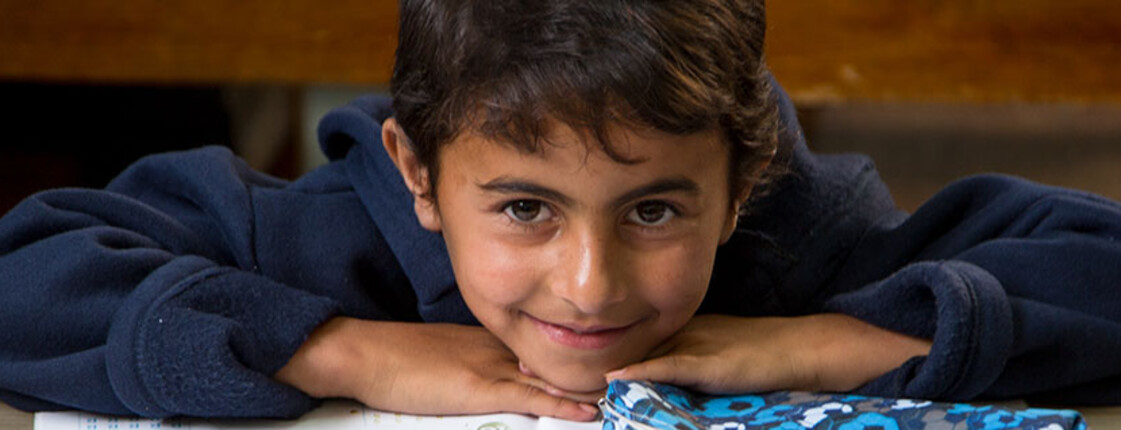Stories - What does it mean for those affected?

© Maria de la Guardia
Omar, 5, is in kindergarten and receives psychosocial support in Jordan
Omar (name changed to protect individual) is five years old and attends of one of Caritas Jordan’s kindergartens in Amman, supported by the RHEP educational programme. When Omar was a baby, his mother had to flee with him and his four siblings from their home town of Homs in Syria to Jordan. The new life situation and the insecurity whether the family father was still alive put a heavy burden on the family. Like many Syrian refugee children, Omar also has to struggle with the consequences of traumatic experiences. Extreme behaviours such as aggression and hyperactivity are not uncommon. Omar too showed aggressive behaviour in the Caritas kindergarten in the beginning and often quarrelled with his peers.
The RHEP educational programme of Caritas with its holistic approach helps children like Omar: In addition to playful activities with children the same age, children in the Caritas kindergarten programme are accompanied by specific psychosocial measures, such as painting and doing handicrafts, but also group projects. Omar is already attending the Caritas Kindergarten for the second year. His aggressive behaviour has subsided continuously and today he is more open and cheerful. The five-year-old now prefers putting all his energy into playing with his friends. As the head of the kindergarten proudly says about the boy: "It’s incredible how Omar has developed. He participates in all activities. At our graduation ceremony, he even danced through the room."
Although Omar visibly enjoys the atmosphere and safety of the kindergarten, the boy is very much looking forward to regularly attending a public school in the coming school year and will also be supported through tutoring lessons by the RHEP education programme of Caritas.

Lina, 19, receives training for the first time in her life
Lina (name changed to protect individual) is 19 years old and had to flee from Syria to Jordan with her family in 2013. The young woman has Down Syndrome and lives with her mother in precarious circumstances. At the local Caritas Centre – where the family also receives medical help – Lina learned about vocational training for young women from social workers: Since Lina herself was never integrated into the formal education system in Syria (the cost of a school that would have satisfied Lina's needs could not be afforded by the family), this is the first opportunity in Lina's life to attend an education programme. It is also the first time Lina leaves the house all by herself, as her mother proudly tells.
Like many people with disabilities, Lina was often confronted with discrimination and bullying, which further complicated the already harsh conditions for young Syrian women in Jordan. The participation in the vocational training programme within the RHEP programme was therefore a great challenge for the young woman. In the beginning, she was very shy and reluctant towards contact with other participants, but the Caritas training programme also offered important psychosocial support, which made it much easier for Lina to exchange ideas with other women of her age, to open up and make friends.
The teachers and social workers also responded to her needs and made sure that Lina could take as much as possible from the lessons with her for her future life. Today, Lina is a determined and hard-working learner who tries to go her own way. “It’s actually the first time Lina feels like an independent person," Lina's mother says proudly about her daughter.

Yaser, 9, attends school and receives speech therapy. His father is supported by family counselling.
Yaser (name changed to protect individual) is nine years old and had to flee Syria with his parents in 2013. The family now lives in Lebanon and Yaser attends the second grade in a school supported by the RHEP education programme. His father is working, his mother suffers from a chronic illness, which also is a burden for Yaser and his family.
At the beginning of the school year, Yaser was noticabely aggressive and the teachers originally classified him as an aggressive problem child. Subsequently, Yaser spent a lot of time talking to social workers in individual sessions, which provided him the attention he desperately needed. In these one-on-one sessions Yaser was able to open up and the social workers worked with him on his attitude towards school and his classmates and thaught him how to set himself small goals which can be achieved every day and help him grow with each task – at school and within the family.
At the same time, the social workers also worked intensively with Yasser's father, who has been very strict and disciplining with his children. More child-friendly and loving ways to deal with his children were indtroduced: More attention and patients as well as the focus on parental care became an integral part of family life. The change within the behaviour of the father, who was always very open-minded towards enhancing the family climate, in combination with the development in Yaser's behaviour, quickly had a great effect: Yaser made friends at school and his grades improved. He also felt good at home again and generally showed much more confidence in his own abilities and talents! Today, Yaser is particularly proud of his eleven "diligence stickers", which his teacher has already awarded him because of the great progress he has made.